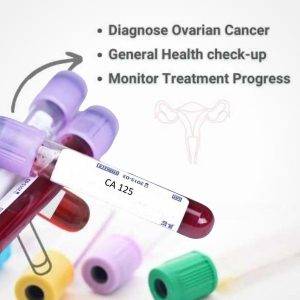“A CA125 level above 35 is a sign of cancer – get tested today!”
Overview
One of the most common tests used to detect ovarian cancer is the CA125 test, which measures the amount of protein in the blood.
A high level of CA125 in the blood can indicate the presence of cancer, and the level of CA125 can be used to monitor the progression of the disease.
Generally, a CA125 level of 35 units per milliliter (U/mL) or higher is considered to be an indication of cancer.
What is CA-125?
CA-125 called Cancer Antigen 125, is a protein biomarker found in the blood that is used to detect the presence of ovarian cancer. It is a glycoprotein that is produced by the cells of the ovaries, fallopian tubes, and other tissues in the body.  Elevated levels of CA-125 can indicate the presence of ovarian cancer, but it is not specific to this type of cancer and can also be elevated in other conditions such as endometriosis, uterine fibroids, and pelvic inflammatory disease.
Elevated levels of CA-125 can indicate the presence of ovarian cancer, but it is not specific to this type of cancer and can also be elevated in other conditions such as endometriosis, uterine fibroids, and pelvic inflammatory disease.
What is the Normal Range for CA125 Levels and How Does it Relate to Cancer?
CA125 test is used to monitor the progression of the disease and to determine the effectiveness of treatment. The normal range for CA125 levels is 0-35 U/mL.
Ovarian Cancer patients sometimes have higher levels of CA125.
When CA125 levels are elevated, further testing is usually recommended to confirm the diagnosis. This may include imaging tests such as ultrasound or CT scan, as well as a biopsy.
If ovarian cancer is confirmed, CA125 levels can be used to monitor the progression of the disease and to determine the effectiveness of treatment.
How Accurate is CA125 Testing in Detecting Cancer?
CA125 testing is a widely used biomarker for the detection of ovarian cancer. It is a protein found in the blood that is produced by the cells of the ovaries and other organs.
Studies have shown that CA125 testing is highly sensitive and specific for the detection of ovarian cancer. In one study, the sensitivity of CA125 testing was found to be 95.2%, meaning that it correctly identified 95.2% of the cases of ovarian cancer.
The specificity of the test was also found to be high, at 97.2%, meaning that it correctly identified 97.2% of the cases that were not ovarian cancer.
In addition, CA125 testing is effective in detecting early-stage ovarian cancer. In one study, the sensitivity of CA125 testing for detecting early-stage ovarian cancer was found to be 88.9%. This indicates that CA125 testing is an effective tool for detecting early-stage ovarian cancer.
What is the Difference Between Elevated CA125 Levels and Cancer?
Elevated CA125 levels and cancer are two distinct medical conditions that are often associated with one another.
CA125 is a protein that is found in the blood and is used as a marker for ovarian cancer.
Elevated CA125 levels can be an indication of ovarian cancer, but it is not a definitive diagnosis.
Cancer is a disease that is characterized by the uncontrolled growth and spread of abnormal cells.
It is important to note that elevated CA125 levels do not necessarily indicate the presence of cancer, and further testing is needed to determine the cause.
What Are the Benefits and Limitations of CA125 Testing for Cancer Detection?
The primary benefit of CA125 testing is its ability to detect cancer at an early stage. Early detection of cancer can lead to more effective treatment and improved outcomes.
CA125 testing is also relatively non-invasive, as it only requires a simple blood draw.
However, CA125 testing also has some limitations. For example, CA125 testing is not always accurate. It can produce false-positive results, meaning that it can indicate the presence of cancer when none is present.
Additionally, CA125 testing is not always sensitive enough to detect cancer in its early stages. It may not detect cancer until it has progressed to a more advanced stage.






